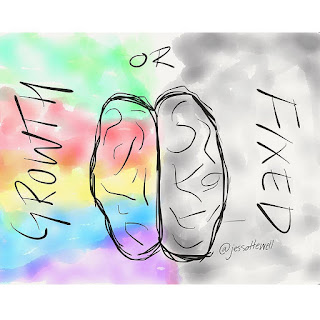Feedback Strategies
I like that we are studying these feedback strategies. As we discussed last week, feedback is an important element for improving ourselves and the work that we do. In other classes, specifically ones where we post discussions online and have to give our feedback as part of our assignment, I have always dreaded the task. There is a pressure to get the reply post submitted and this has affected the quality of my feedback, as well as others. One of the articles that I read was, How To Give Students Specific Feedback That Actually Helps Them Learn. In this article, I learned how to make my feedback "goal-oriented." In other classes, I am guilty of replying with, "Good job," "this is amazing," etc., because I found myself running out of time, I did not want to be the 'bad guy', and mainly because I did not know how to give effective feedback. Having learned this new technique, it will be easier to expand on other people's ideas, maybe throw out an idea that came to mind when reading their post, etc. This way I can avoid my comments being perceived as offensive, which is never my intention.
The other article I read was, A Troubling Side Effect of Praise by Youki Terada. This article discussed the research, led by Li Zhao, that tested young children and how the level/type of praise that they received affected the probability of them cheating. Zhao's research found that the those who received the highest amount of praise ("ability praise") were more likely to cheat than those who received a 'medium' amount ("performance praise") and those who did not receive praise ("baseline group"). Although there were children in each group that cheated, the ones who received the highest amount of praise, "ability praise," cheated because they felt "pressured to meet people's expectations" (Terada 2017). This article relates back to Dweck's idea of a "growth mindset" and how those with that mindset see challenges differently than those with a "fixed mindset," where the latter feels defeated by the obstacle and looks for 'shortcuts' because they do not want to jeopardize their intelligence and other's perception of it.
I think it is sad that anyone, child or adult, would feel the need to cheat because of the need to fell intelligent and be perceived as so, all for keeping up with other's (society's) expectation of them. I have learned in my criminology class that a lot of reasoning behind why someone cheats or commits any criminal act, is because of a stressor. It will be interesting to see if the idea of a "growth mindset" versus a "fixed mindset" will be applied to criminals. The mindset of a criminal is a major factor in why they choose to commit the crime. Will this be something that can help prevent criminality?
The other article I read was, A Troubling Side Effect of Praise by Youki Terada. This article discussed the research, led by Li Zhao, that tested young children and how the level/type of praise that they received affected the probability of them cheating. Zhao's research found that the those who received the highest amount of praise ("ability praise") were more likely to cheat than those who received a 'medium' amount ("performance praise") and those who did not receive praise ("baseline group"). Although there were children in each group that cheated, the ones who received the highest amount of praise, "ability praise," cheated because they felt "pressured to meet people's expectations" (Terada 2017). This article relates back to Dweck's idea of a "growth mindset" and how those with that mindset see challenges differently than those with a "fixed mindset," where the latter feels defeated by the obstacle and looks for 'shortcuts' because they do not want to jeopardize their intelligence and other's perception of it.
I think it is sad that anyone, child or adult, would feel the need to cheat because of the need to fell intelligent and be perceived as so, all for keeping up with other's (society's) expectation of them. I have learned in my criminology class that a lot of reasoning behind why someone cheats or commits any criminal act, is because of a stressor. It will be interesting to see if the idea of a "growth mindset" versus a "fixed mindset" will be applied to criminals. The mindset of a criminal is a major factor in why they choose to commit the crime. Will this be something that can help prevent criminality?
(Illustration of a Growth vs. Fixed Mindset by Jessica Ottewell. Source: Flickr)




Comments
Post a Comment